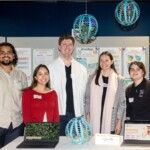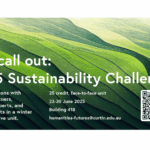The Sustainable Futures Platform supports research, learning and engagement activities within the Faculty of Humanities and across Curtin University, building on Curtin’s international reputation for leadership in this space.
Curtin School of Design and the Built Environment Geographer wins a prestigious French FIASS Fellowship
Faculty of Humanities Geographer, Professor George Curry, has been awarded a 10-month Fellowship under the French Institutes for Advanced Study Fellowship Program (FIAS).
New National Environmental Science Program 2 (NESP2) Research Projects Launched
National Environmental Science Program funds have been secured for the projects ‘Identifying Opportunities from Waste Management and Resource Recovery and the Circular Economy for Indigenous Communities and Businesses’ 2024-2025 and ‘Water Sensitive and Liveable Communities‘ 2024-2025
Faculty of Humanities Geographer, Professor George Curry, has been awarded a 10-month Fellowship under the French Institutes for Advanced Study Fellowship Program (FIAS). FIAS is funded by the EU’s Horizon 2020 research and innovation program under the Marie Sklodowska-Curie grant agreement. Professor Curry, of Curtin’s School of Design and the Built Environment is a founding member of the Pacific Livelihoods Research Group. This research group seeks to understand the factors that enhance or constrain the adaptive capacity and resilience of households and communities, to manage livelihood opportunities and risks. This research program is aligned with most of the UN 2030 SDGs, especially SDGs 1-6, and is linked to Curtin University’s new Futures Platforms, Sustainable Futures, Global Futures and Indigenous Futures.
Through action research, the group aim to build the adaptive capacity and resilience of households and communities by strengthening and diversifying the livelihood options of people, particularly women and the asset-poor who are more vulnerable to livelihood insecurity. “Our research is strongly participatory involving rural households and communities. We are often involved in extended periods of fieldwork in the communities where we work. Currently, we are researching agricultural systems, particularly agrodiversity and agroforestry; food security; land access and land use change; labour and mobility; indigenous and moral economies; and gendered lives” Professor Curry said.
The research groups’ industry partners are also involved directly in the research. They include smallholder families, NGOs, church-based and government organisations, as well as private sector organisations working with smallholder families. The Pacific Livelihoods Research Group is comprised of researchers from a range of national and international organisations. The core organisations in the research program include Curtin University, CSIRO, James Cook University, and in PNG, the Cocoa and Coconut Institute, Coffee Industry Corporation, Oil Palm Research Association and the University of Technology.
At Curtin University, the research program is located within the Curtin School of Design and the Built Environment in the new exchange precinct. The program has direct links to the Curtin University Geography undergraduate specialisation.
Professor Curry will commence his Visiting Fellowship to CIRAD, Centre for International Research in Agricultural Development in October of 2024. CIRAD is a French-based research institute concentrating on research and development programs in South America, Africa, and the French-speaking Pacific.

Professor George Curry
In a separate initiative, Associate Professor Atiq Zaman from the Curtin University Sustainability Policy Institute, along with Mr. Frederick Yasso and Dr. Shaouli Shahid from the Centre of Aboriginal Studies, have secured National Environmental Science Program funds of $125,000 for the project “Identifying Opportunities from Waste Management and Resource Recovery and the Circular Economy for Indigenous Communities and Businesses” in 2024-2025.
Based on identified waste issues and community priorities, the project aims will focus on co-designing practical waste management solutions, engaging with local Aboriginal Communities in Western Australia, to address waste management challenges, exploring Circular Economy approaches and solutions.
The project will closely work with the local Whadjuk Noongar Community, to understand the waste issues they face, the Community’s priorities and their Indigenous knowledge about resource efficiency.

Associate Professor Atiq Zaman

Dr Shaouli Shahid

Mr Frederick Yasso
Curtin’s Associate Professor Mohammad Swapan has also been successful in securing National Environmental Science Program funds to the value of $52,500 with a project value of $105,000 on ‘Water Sensitive and Liveable Communities‘ in 2024-2025.
This project’s objective is to understand what research is needed to address knowledge gaps and improve knowledge products to benefit regional and remote communities. The project team will be working with Park Australia (research users) to scope the first living laboratory arrangements which picks up on the place-based research component.
This will be delivered in and alongside Parks Australia to support the development of a Traditional Owner-led Integrated water management Plan for Uluru Kata Tjuta Nat Park. It is hoped this work will also inform a framework for Parks Australia for subsequent works and opportunities to scale this research collaboration as a result.

Associate Professor Mohammad Swapan



